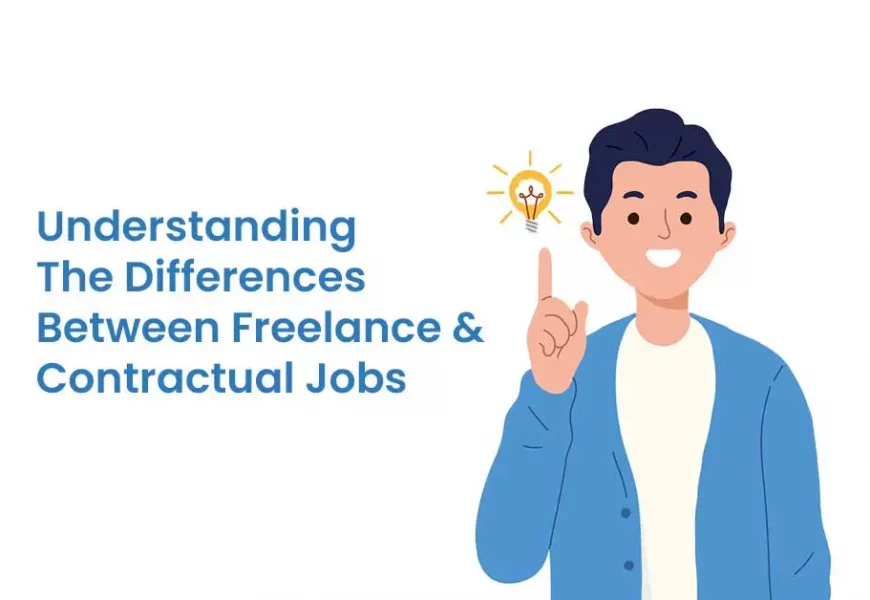Companies can choose their workforce requirement from full-time to temporary and contract to freelance. In this day and age, not many people want the 9-5 job. Millennials and Zoomers now opt for jobs that guarantee flexibility. So, many of them choose to freelance or take on contractual jobs.
If you are planning to go for a contract or freelance job, you must know the differences between the terms to choose the right one for yourself.
In this article, let’s take a closer look at the difference between a freelancer and a contract employee.
Who Is A Freelance?

A freelancer is a self-employed worker who offers his services to different organisations. He chooses the projects and whom to work for (he can take as many clients as he wishes) according to his schedule. He is responsible for his tax payments and setting his rates.
Examples: Freelance content writers or graphic designers.
Who Is A Contract Employee?

A contract employee is an independent contractor who works temporarily for organisations. His contract can range from a month to even years, depending on the services required by the organisation. Usually, contract workers work on-site in the company office and have to abide by the rules and codes mentioned in the contract.
Example: Doctors or lawyers
Freelance vs Contract
Although both are not full-time, freelance and contract jobs have many differences. Take a look at them to know which career path to take.
| Basis Of Comparison | Freelancer | Contract Worker |
| Project | You can control which jobs you want to take as a freelancer. You can take on as many projects as you wish, provided you can meet your deadlines. | As a contract worker, you will have control over which job you want to take. However, unlike a freelancer, you will not be able to take on multiple projects at a time because it is likely that the project you take will be of larger scope. |
| Time Frame | As a freelancer, the time frame for the projects you take can range from a day to even years, depending on clients’ requirements. However, your position will remain temporary no matter how long the work may last. | Like freelancers, contract workers are also temporary employees. However, you can choose projects with a longer time frame, or the company may extend the contract to a full-time position. |
| Clients | As a freelancer, you can choose as many clients as you wish as long as you can complete your work on time. | Compared to a freelancer, as an independent contract worker, you will not be able to take on multiple clients simultaneously as the projects will be larger. |
| Schedule | As a freelancer, you will have the flexibility to work whenever you want as you probably will not have to go to the client’s office daily. | As an employee under a contract, you will most likely have to work at the client’s workplace and follow their traditional office schedule. |
| Income | As a freelancer, you have the freedom to set your own rate as per market value. You will be responsible for handling the invoices and receiving payments. | As a contract worker, you will be paid based on the project or time frame set by the client. You can negotiate as well. Depending on the client, you will also be responsible for invoicing. |
| Benefits | As a freelancer, you will not be able to enjoy the benefits and perks, such as medical insurance, HRA, PF, etc., that full-time employees do. | As a contract worker, you will not be able to enjoy benefits and perks, such as medical insurance, HRA, PF, etc., that full-time employees do. However, if registered on our Contract Jobs portal, you’ll receive social security benefits like PF and ESIC. |
| Taxes | You will be responsible for paying your own taxes. | You will be responsible for paying your own taxes. |
| Equipment | You must use your own laptops or other devices. | Depending on the client, you may or may not need to provide your own equipment. |
| Expenses | You will be responsible for travel or training fees. | You will be responsible for travel or training fees. However, depending on your contract and how you negotiate, some companies may offer to cover some expenses. |
| Location | You will not necessarily need to go to your client’s office to work as a freelancer. You have the freedom to choose your workplace. | As a contractor, the location of your work depends on the client. You will most probably have to go to their office daily. |
| Hiring | You can hire others to work for you depending on your requirement and budget. | You can hire others to work for you depending on your requirement and budget. You can even hire freelancers |
Conclusion: Now that you know the differences between a freelancer and a contract worker, we hope your decision-making process of considering which career path to choose becomes a tad easier.
We will leave you here with our best wishes!
Good luck!



